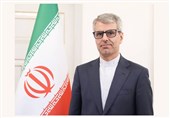Leader: US, Most Hated Power among World Nations
TEHRAN (Tasnim) – Supreme Leader of the Islamic Revolution Ayatollah Seyed Ali Khamenei on Sunday described the US as the most hated power in the world, saying that its hegemonic attitude has caused other nations to develop enormous aversion and distrust to that country.
Referring to the arrogant attitude of the US governments throughout the history, the Leader explained that such approach has resulted in the nations’ deep distrust of the US and aversion to it.
“Experience has proved that every nation and government which trusts the US, will sustain damage, even if it is a friend of the US,” the Leader told a large gathering of Iranian students here in Tehran, on the eve of the National Day against the Global Arrogance (November 4).
He further described the US as the most hated power, saying if a fair poll were conducted across the world it would reveal the extent to which the US is despised by people of different countries.
Ayatollah Khamenei further explained that US enmity towards the Islamic Republic was not due to Iran’s nuclear program, which he described as a "pretext for Americans," but stressed that the US is opposed to “the entity of the Islamic Republic as well as the influence, credibility and might” of the system elected by the Iranian nation.
"The US gives up its antagonism only when our nation becomes isolated and loses its dignity and respect," he added.
"Was there the issue of nuclear program when the US imposed sanction on Iran in the beginning of the revolution, or when it targeted an Iranian passenger aircraft and killed 290 people onboard it, did it have the nuclear program pretext?" asked the Leader.
Ayatollah Khamenei also touched upon the seizure of the US embassy in Tehran by a group of students in 1979, and added that the US embassies in the European countries are now being referred to as “den of espionage,” something the Iranians first used more than 30 years ago.
“This issue reveals that our youths were beyond the calendar of world’s history for more than thirty years,” the leader pointed out.
Recent revelations of spying and phone tapping by the US against many countries -- even its close allies -- carried out in large parts in its diplomatic missions, give credence to the Iranian nation's assertions that the US embassy in Tehran was a "den of espionage."
The US spying operations have targeted leaders and citizens of other nations including some of its close allies like Germany, France, Italy and Spain.
Former National Security Agency (NSA) contractor Edward Snowden revealed that Washington monitored the phone conversations of German chancellor Angela Merkel. The disclosure prompted the German chancellor to call US President Barack Obama to seek reassurance that her phone calls were no more targeted by US spying.
Reports of the US spying have stirred outrage in the countries that have been the target of the spying operations.
Commenting on the nuclear talks on Iran’s peaceful nuclear program, Ayatollah Khamenei said, “I am not optimistic about the ongoing negotiations, because it is not clear whether they would bring about the results expected by the nation.”
“My advice to the officials in the arena of diplomacy and negotiations is to be vigilant so that the deceptive smile of the enemy does not lead you to make a mistake and error,” added Ayatollah Khamenei.
The Supreme Leader’s comments came after Iran and the G5+1 (the US, Russia, China, Britain, France as well as Germany) wrapped up two days of talks over the Islamic Republic’s nuclear energy program in Geneva, Switzerland, on October 16. Further talks are slated for November 7-8 in Geneva.
“But” the leader noted “we believe this experience (nuclear talks) would not pose a problem, provided that the nation is awake and knows what is happening.”
The Leader further lent his support to the team of Iranian negotiators in nuclear talks, and stressed, “Nobody should weaken or insult them, or regard them as compromising.”
On November 4, 1979, and in less than a year after the victory of the Islamic Revolution that toppled a US-backed monarchy, Iranian university students that called themselves "students following the line of (the late) Imam (Khomeini)" seized the US embassy in Tehran.
The students justified the takeover by insisting that the compound had become a center of espionage and planning to overthrow the newly established Islamic system in Iran.
The students who seized the embassy later published documents proving that the compound was indeed engaged in plans and measures to overthrow the Islamic system.
Every year on the 13th day of the Iranian month of Aban (November 4), the Iranian nation, particularly the students, hold rallies across the country to mark the day.





